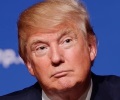

Donald Trump’s Save America fundraising committee has raised more than $90 million since his election defeat last year, one of the biggest hauls by any Republican group.
The massive sum illustrates the former president’s grip on the party but also poses a problem – Trump’s war chest is so large that even if the committee were to make the $5,000 maximum donation to a Republican in every congressional election it would take decades to spend it.
But a disclosure filed by Save America on Saturday highlights what experts expect will be a primary outlay: It could fund years of Trump rallies, preparing for a possible 2024 White House run while ostensibly helping other candidates.
Campaign finance experts say that under Federal Election Commission rules, Save America can fund Trump’s political travel and activities, but not his presidential campaign should he launch a bid, something he has yet to do.
Save America spent more than $700,000 on events in the first half of 2021, according to the FEC filing.
The spending, among the largest expenditures made by the committee, helped pay for his first post-White House rally in Wellington, Ohio, in June, as well as prepayments for a July rally in Sarasota, Florida, and a news conference at his New Jersey golf course, Trump’s office said.
The rally on June 26, attended by close to 30,000 supporters, marked a return to the freewheeling format Trump relished during his presidency: speeches before big crowds.
An aggressive schedule of rallies could burn through many millions of dollars, while also remaining within campaign finance rules so long as the events support other candidates, said Michael Beckel, research director at Issue One, a nonpartisan group that advocates for campaign finance reform.
“There’s a lot that he could do with $90 million to bolster his own brand,” Beckel said.
Trump’s war chest rivals those held by the Republican party’s biggest fundraising committees. In the first six months of this year, Save America raised $62 million, compared to $85 million by the Republican National Committee and $79 million by the party’s committee that supports congressional candidates.
Trump also controls his former campaign’s fundraising committee, which this year has aimed most of its $13 million in spending at covering legal fees and Trump’s efforts to reverse his November election loss.
NO CONTRIBUTIONS YET
With vast funds at his disposal, Trump will need to find ways to support other Republican candidates.
Other Trump-aligned groups have made large outlays in recent weeks along those lines. One last month made a last-minute $100,000 TV ad buy to help a candidate he had endorsed in a U.S. House of Representatives race in Texas, who lost her race, and also spent over $400,000 in support of a House candidate in Ohio, who won his Tuesday primary.
The Save America committee would have no limits on such spending as long as it was not coordinated with allied campaigns.
But it has yet to make any such expenditures, according to the disclosure which covered its activities through June. The filing showed no contributions to candidates, though a Trump spokesperson said $5,000 checks were sent in July to candidates he has endorsed.
After next year’s congressional elections, when the Democrats’ razor-thin majorities in both chambers of Congress will be on the line, it could be harder for Save America to argue that its rallies serve interests other than Trump’s, said Paul Ryan, an attorney at Common Cause, a nonpartisan group that advocates for government reform.
“It will be incumbent on the Federal Election Commission to crack down and declare that an illegal use of non-candidate funds for a presidential campaign,” Ryan said.
At the Ohio rally, Trump touted his support for Republicans Max Miller and Mike Carey, who are seeking seats in the U.S. House. But he spoke at greater length about his own presidency and the shortcomings of President Joe Biden, while hinting he could be on the ballot in 2024.
Trump’s spokesperson did not respond to requests for comment.
Save America’s biggest outlay in early 2021 was a $1 million contribution to a pro-Trump policy group whose leadership includes veterans of Trump’s administration.
The committee also spent more than $65,000 at Trump hotels.
That raises additional concerns, said Erin Chlopak, director of campaign finance strategy at the nonpartisan Campaign Legal Center, which advocates for strict enforcement of campaign finance laws.
“It’s not just paying for fancy dinners or lodging, it’s having the double effect that the person using that donated money is also personally profiting off of it,” Chlopak said.
Source: Reuters (Reporting by Jason Lange; Editing by Scott Malone and Daniel Wallis)